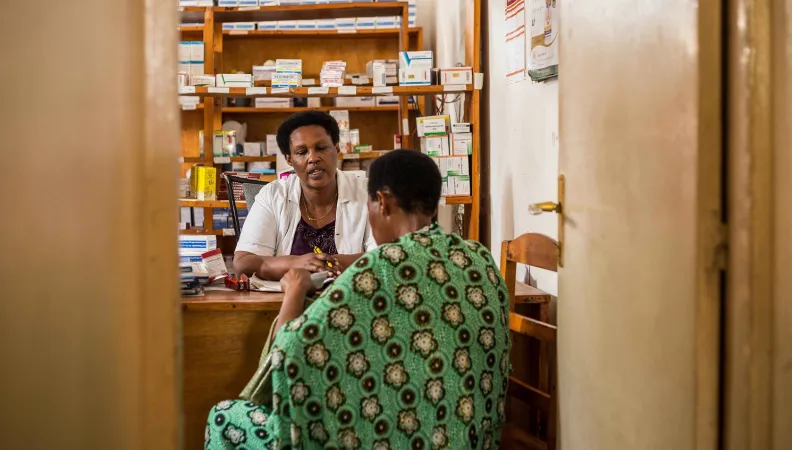 Africa remains a young continent. However, the ongoing demographic transitions are accompanied by an anticipated aging population — and in some countries, this process has already begun. Although a wide variety of situations coexist across the continent, the growing number of older people will require significant adjustments to public policies, including fiscal, health, and social measures.
Africa remains a young continent. However, the ongoing demographic transitions are accompanied by an anticipated aging population — and in some countries, this process has already begun. Although a wide variety of situations coexist across the continent, the growing number of older people will require significant adjustments to public policies, including fiscal, health, and social measures.
Context
In many African countries, older people still represent a very small share of the population (3% in sub-Saharan Africa and 5.6% in North African countries). For a long time, they have been largely overlooked by public policies, which have focused instead on the most urgent needs of economic, social, and health development — primarily targeting children and young adults.
However, the number of older people is increasing — not only in absolute terms but soon also in relative terms, with aging projected to occur more rapidly than in other regions. The challenge now is to design and implement appropriate public policies to support this demographic shift, particularly in the areas of health and social protection.
New forms of coverage and protection are emerging — or becoming essential — such as cash transfers, which complement family-based solidarity systems, free healthcare and services for older adults, the expansion of so-called universal pension and retirement schemes, and more broadly, private support systems on which most older people on the continent must still rely.
Objectives
This research project provides a framework for understanding population aging and related public policies across the African continent, from a comparative perspective. It examines the aging process, its associated challenges, the public policies addressing it, and the institutional frameworks in various countries, focusing on emblematic case studies that reflect diverse situations (South Africa, Cameroon, Cape Verde, Kenya, Morocco, and Senegal). The project also includes targeted analyses based on recent data, highlighting the contributions of demographic research to issues of health and social protection (notably pensions) for older adults.
The project resulted in a valuable overview for policymakers in AFD’s partner countries, contributing to broader reflections on the conditions under which different public policy models may or may not be replicated across the African continent.
Method
The project is based on a comparative analysis of secondary demographic data drawn from existing sources — including research papers, reports, and scientific literature. By presenting the different trajectories of demographic transitions, it offers an overview of aging across the continent, including its timing and context, and explores the associated challenges for both national and local public policies. It highlights regional, national, and subnational variations in aging, in order to identify the areas that are either most advanced in this process or experiencing the fastest pace of change.
Focused case studies on a selection of countries representing different situations provide a systematic critical review along the following lines:
- a socio-demographic and health overview;
- a description of the institutional framework and public policies in place;
- a critical analysis of the social and health-related challenges of the aging process;
- and an exploration of how aging is transforming family structures — particularly regarding intergenerational transfers, migration patterns, and women’s labor participation.
Results
The research project led to the following publications:
- The publication of the research paper “Africa Facing Its Aging Population: What Are the Challenges for Public Policy?” (in French, June 2024);
- The release of “How can healthcare for older people in sub-Saharan Africa be improved?” (April 2024);
- The publication of “Health Statistics on Older Adults in Sub-Saharan Africa: A Literature Review” (in French).
In July 2023, a webinar from the Research Conversations series presented the project’s initial findings (in French only):
Research findings
Africa is expected to face the challenge of an aging population in the coming decades. The first and foremost challenge lies in expanding social protection coverage, which is currently the lowest in the world: only 17% of the population is covered. This low rate is partly due to the predominance of the informal economy, which hinders the development of a contributory social protection system — particularly in rural areas. There is now a pressing need to strengthen public policies aimed at expanding social protection to a broader share of the population, both in rural and urban areas.
However, the evolution of social protection systems — particularly in health and pensions — rests on several key pillars that remain uncertain and have historically been prerequisites for their expansion:
- First, the effective collection and use of tax revenues to finance social protection;
- Second, the promotion of stronger links between pension and health coverage;
- And finally, sustained economic growth driven by a development model — historically industrial and manufacturing-based — that enabled the establishment of such public policies.
Yet in Africa, this economic model, centered on formal employment, has not taken root. Moreover, the impacts of climate change are raising fundamental questions about this development path, making it even more difficult to design and implement aging-related public policies — just as they are becoming increasingly necessary.
READ OUR RESEARCHER'S INTERVIEW
Serge Rabier: ‘Many African Countries Have No Social Protection Programmes For Elderly’
Want to stay updated on AFD’s latest research?
Contact
 How can digital commons support the empowerment of actors historically excluded from public action? This action-research project follows the development of the Brasil Participativo digital platform, launched by the Brazilian government in the summer of 2023.
How can digital commons support the empowerment of actors historically excluded from public action? This action-research project follows the development of the Brasil Participativo digital platform, launched by the Brazilian government in the summer of 2023.
Contexte
As part of the revival of participatory forums dismantled under the presidency of Jair Bolsonaro (2019–2022), this project is an action-research initiative focusing specifically on the implementation of the Brasil Participativo platform. Launched by the Brazilian government in the summer of 2023, this platform aims to facilitate citizen contributions to the creation and improvement of public policies. It was developed using the Decidim web environment — a digital participation platform that, as of 2023, was being used in 30 countries and by 240 institutions.
This project was selected under AFD's call for research proposals on “Commons and Citizen Participation”, which invited proposals exploring how commons contribute to democratic practices and citizen participation; the interactions between commons-based actors and public institutions; and the capacity of commons to shape public action.
The project is part of AFD’s research program on the commons and will contribute to ongoing reflections on the “commons-based approach” — a framework closely tied to issues of democracy and citizen engagement, as it seeks to establish shared, operational governance of the complex challenges faced by public authorities, in partnership with citizens.
FIND OUT MORE ABOUT...
Objectives
This action-research project aims to:
- Analyze the Brasil Participativo initiative over the 2023–2025 period through the lens of the commons approach — focusing in particular on its governance, use, and user-generated contributions;
- Formulate recommendations on the development and governance of the platform, in order to embed principles derived from the commons approach.
Various federal public actors will be involved in the research activities, using a sector-specific approach. Through this sustained dialogue throughout the project, the ambition is to foster stronger connections between public institutions and civil society actors — especially groups that have traditionally been excluded from participatory processes, such as women, people of color, and Indigenous communities.
Method
The project will be carried out by a multidisciplinary team, bringing together academics and civil society actors with expertise in social movements, state–society relations, digital commons, and digital participatory arenas. Public institutions will be involved from the very beginning of the project.
The methodology will combine both qualitative and quantitative approaches — including interviews, document analysis, participant observation, and user data.
Results
The project will lead to:
- Publications, including a final report, research papers, and policy briefs;
- Communication materials co-produced with public institutions and civil society actors;
- The creation of dialogue spaces through co-construction workshops and seminars.


